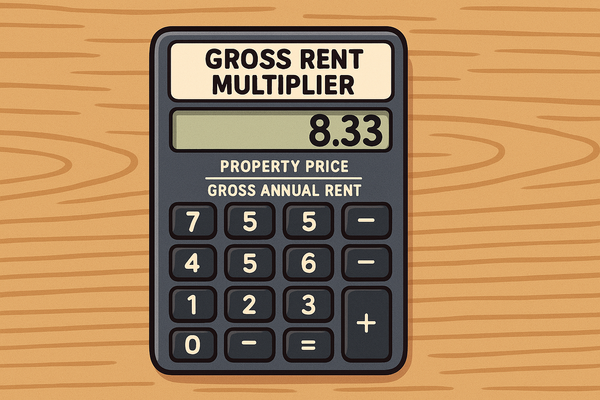Certificate of Title: What Landlords Need to Know
Learn everything property managers need to know about certificates of title: verification processes, legal implications, and best practices for effective property management

Understanding Legal Documentation for Effective Property Management
A certificate of title is a critical legal document that forms the foundation of property ownership verification in real estate management. For property managers and landlords, understanding this document is essential for ensuring legal compliance, protecting client interests, and facilitating smooth property transactions.
Did you know? In the Torrens title system used in some jurisdictions, the certificate of title itself is the actual title—not just evidence of it—making it the definitive record of ownership that supersedes all other claims!
In this comprehensive guide, we'll explore everything property managers need to know about certificates of title – from basic definitions to practical applications, legal considerations, and best practices. Whether you're managing residential rentals, commercial properties, or a diverse portfolio, this knowledge will help you navigate property ownership documentation with confidence.
Definition and Background
What is a Certificate of Title?
A certificate of title is an official document issued by a state or municipal authority that identifies the owner(s) of real property, serving as documentary evidence of ownership rights. While primarily associated with real estate, certificates of title may also apply to businesses, vehicles, boats, and other property types.
When issued for real property by a title insurance company, the certificate represents a statement of opinion on the title's status, based on a thorough examination (title search) of specified public records. In its broadest modern sense, "title" has evolved to mean both the certificate showing record ownership and ownership itself.

Types of Title Registration Systems
Two primary systems exist for property title registration in the United States:
- Abstract System: The most common form used throughout most of the United States, where an abstract serves as evidence of title
- Torrens System: Used in some jurisdictions, where the certificate of title is itself the title (not just evidence of it)
Understanding which system applies in your jurisdiction is essential for proper property management and documentation handling.
Legal Context and Evolution
The concept of title has deep roots in property law, evolving from physical documents to sophisticated legal instruments. As a legal term, "certificate of title" has specific definitions in various contexts. For example, the U.S. Code specifically defines it in the automotive context as "a document issued by a State showing ownership of an automobile."
In property management contexts, this basic concept extends to various property types while maintaining the core function of proving ownership rights. The format and requirements for certificates of title vary by jurisdiction, but their fundamental purpose remains consistent: documenting who legally owns the property.
Significance in Property Management
Why Certificates of Title Matter to Property Managers
For property management professionals, certificates of title serve several critical functions:
- Verification of Client Ownership: Before entering management agreements, property managers must verify that clients actually own the properties they claim to own. Certificates of title provide this verification.
- Authority Establishment: When representing property owners, managers need documented proof of the owner's rights to authorize management activities, particularly when dealing with government agencies or financial institutions.
- Transaction Facilitation: During property sales, refinancing, or other transactions, certificates of title play a central role in establishing clear ownership and enabling smooth transfers.
- Risk Management: Understanding title status helps property managers identify potential legal issues that could affect their clients or management operations.
According to a National Association of Realtors study, title issues are involved in approximately 25% of real estate transactions, highlighting the importance of proper title documentation and verification in property management.
Financial Implications
Certificates of title have significant financial implications, particularly for mortgaged properties. When a property is purchased with a mortgage, the buyer may consider themselves the homeowner, but the lender actually possesses the certificate of title until the final mortgage payment is made. This arrangement protects the lender's financial interest throughout the loan term.
For property managers handling client-owned properties with outstanding mortgages, understanding this relationship is essential for navigating refinancing, equity lines of credit, or other financial transactions that may affect the property. Additionally, understanding capital improvement tax strategies becomes important when managing properties where title-related value enhancements impact taxation.
Practical Applications
How Property Managers Use Certificates of Title
Scenario 1: New Management Agreement Verification
Situation: A property management company is approached by a potential client wanting management services for a multi-unit residential building.
Application: Before signing a management agreement, the company requests a copy of the certificate of title to verify legitimate ownership.
Steps Taken:
- Examine the certificate to confirm the potential client is the documented owner
- Verify there are no co-owners whose signatures would also be required
- Check for any restrictions or encumbrances that might affect management operations
- Document the verification in the client file
Outcome: The management company enters the agreement with confidence, knowing they're working with the legitimate property owner and understanding any title-related limitations.
Scenario 2: Managing Property Through Ownership Change
Situation: A managed property is being sold, but the new owner wants to maintain the existing property management arrangement.
Application: The property manager must verify the new certificate of title to confirm the ownership transfer and update all management documentation.
Steps Taken:
- Obtain a copy of the updated certificate of title from the new owner
- Verify the complete transfer of ownership rights
- Update all management agreements and documentation
- Inform tenants of the ownership change while confirming management continuity
- Update banking and financial arrangements to reflect the new ownership
Outcome: The property management continues smoothly despite the ownership change, with all legal documentation properly aligned with the new certificate of title.
Scenario 3: Title Issues Affecting Management
Situation: During routine document review, a property manager discovers a potential title defect on a managed property.
Application: The manager must address this issue to protect both the owner's interests and the management company's position.
Steps Taken:
- Notify the property owner of the identified issue
- Recommend title insurance if not already in place
- Connect the owner with legal resources to address the defect
- Document all communications regarding the issue
- Monitor progress toward resolution
Outcome: By identifying and addressing the title issue proactively, the property manager protects the client's interests and reduces potential liability for all parties involved.

Legal and Compliance Considerations
Regulatory Framework
Property titles operate within complex regulatory environments that vary by jurisdiction:
Federal Regulations:
- The Federal Acquisition Regulation (FAR) Part 45 addresses title issues for government property
- Federal Property Management Regulations establish requirements for title reporting
- Various federal agencies maintain specific title documentation standards
State Statutes:
- State laws govern most aspects of property title registration and transfers
- For example, Minnesota has enacted detailed statutes (Chapter 508) specifically addressing land title registration
- State-specific title statutes vary significantly, with notable differences in requirements like statutory periods for adverse possession claims
Local Requirements:
- County and municipal governments often have additional requirements for property title documentation
- Local recording offices maintain title records and may have specific formatting requirements
Common Legal Pitfalls
Property managers should be aware of several title-related legal issues:
Unclear Title Ownership: Situations where ownership is disputed or unclear can create significant legal complications. Property managers should verify clear title before entering management agreements.
Undisclosed Liens or Encumbrances: Outstanding liens, easements, or other encumbrances on the property title can affect management operations and property value.
Forged Documents: Unfortunately, title fraud does occur. Property managers should be vigilant about verifying authentic documentation.
Title Transfer Errors: Mistakes in property description, owner names, or other details can create legal issues that complicate management.
Adverse Possession Claims: In some cases, properties may face adverse possession requirements that challenge ownership rights. Understanding the "OCEAN" criteria (Open, Continuous, Exclusive, Adverse, Notorious) for such claims is essential for addressing potential title disputes.
Compliance Requirements
Property managers must maintain compliance with various title-related requirements:
Documentation Retention: Maintain copies of certificates of title and related documents for all managed properties
Verification Protocols: Establish consistent procedures for verifying ownership before entering management agreements
Disclosure Requirements: When appropriate, disclose title status information to tenants, contractors, or other relevant parties
Reporting Obligations: Follow any jurisdiction-specific requirements for reporting property ownership information
Best Practices for Property Managers
Title Verification Excellence
Comprehensive Initial Verification
When establishing new management relationships, thoroughly verify property ownership through:
- Obtaining current certificates of title from official sources
- Conducting or requesting title searches to identify any issues
- Verifying ownership matches all management documentation
- Checking for co-owners, trust arrangements, or corporate ownership structures
Ongoing Monitoring and Updates
Establish systems to track and update title information:
- Regularly review title status for managed properties
- Maintain alerts for mortgage maturity dates, tax issues, or other events that might affect title
- Update records promptly when ownership changes occur
- Verify title status before major property improvements or management changes
Title Issue Resolution Support
Develop protocols for addressing title problems:
- Create a network of legal resources for addressing title issues
- Establish clear communication procedures for title-related concerns
- Document all title verification activities and issue resolution efforts
- Maintain appropriate insurance coverage for title-related risks
Documentation Best Practices
Records Management
Implement robust systems for managing title documentation:
- Maintain secure digital and physical copies of all title documents
- Establish consistent naming and filing conventions
- Create backup systems for critical ownership documentation
- Implement access controls appropriate to the sensitivity of title information
- Follow property documentation standards that satisfy both legal requirements and business needs
Integration with Management Systems
Connect title information with broader property management processes:
- Link ownership documentation to property management software
- Establish workflows that incorporate title verification at appropriate points
- Create automated reminders for title document reviews or updates
- Integrate title information with tenant communications as needed

Related Concepts
Title Insurance
Title insurance protects property owners and lenders against financial loss from defects in title, undiscovered liens, or other ownership issues. Property managers should understand:
- The difference between owner's and lender's title insurance policies
- How title insurance relates to certificates of title
- When to recommend title insurance to clients
- The process for making claims against title insurance
Understanding both certificates of title and title insurance provides comprehensive protection against ownership disputes.
Deeds and Property Transfer Instruments
Multiple instruments can transfer property ownership, including:
- Warranty Deed: Offers the greatest protection, guaranteeing clear title
- Quitclaim Deed: Transfers whatever interest the grantor has, without warranties
- Special Warranty Deed: Offers limited warranties
- Trustee Deed: Used when property is held in trust
Each instrument relates differently to certificates of title and creates distinct legal relationships that property managers should understand.
Property Records and Public Documentation
Certificates of title exist within a broader ecosystem of public property records:
- County recorder's offices maintain official property records
- Title searches examine these public records to verify ownership
- Property tax records provide additional ownership verification
- Surveys and property descriptions supplement title documentation
Property managers who understand this full ecosystem can more effectively navigate ownership verification.
Property Boundary Disputes
Title issues often intersect with property boundaries. Understanding boundary dispute resolutions is crucial when managing properties with potential border conflicts. The OCEAN criteria (Open, Continuous, Exclusive, Adverse, Notorious) often apply in these cases, particularly when addressing claims related to property lines and usage rights.
Title Abstract vs. Certificate of Title
While related, these documents serve different functions:
- A title abstract summarizes the history of a property's ownership
- A certificate of title states the current ownership status
- In abstract system states, the abstract supports the certificate
- In Torrens system states, the certificate itself is the definitive record
Understanding these distinctions helps property managers interpret documentation correctly.
Common Challenges
Title Defects and Resolution
Common title defects include:
- Clerical errors in public records
- Unknown liens or judgments
- Boundary disputes with adjacent properties
- Missing heirs or undisclosed spouses with ownership rights
- Forged documents in the chain of title
When title issues arise, property managers should work with title professionals and legal counsel to address them promptly and thoroughly.
Unauthorized Occupancy Issues
Occasionally, property managers may encounter situations where unauthorized occupants claim rights to a property. Understanding squatter removal protocols is essential in these cases, as different states have varying requirements for addressing such situations. In New Jersey, for example, the 30-year adverse possession period creates specific challenges for property managers dealing with unauthorized occupants.
Common Questions
What exactly is a certificate of title?
A certificate of title is an official state or municipal-issued document that identifies the owner(s) of personal or real property, providing documentary evidence of ownership rights. It serves as legal proof of who owns the property according to official records.
Does a certificate of title guarantee clear ownership?
No, the certificate itself is not a guarantee of free and clear title. A title search must be completed before settling large transactions to identify any potential issues or claims. This is why title insurance is often recommended as additional protection.
When does a home buyer actually receive the title to their property?
When purchasing with a mortgage, the buyer only receives the certificate of title after making their final mortgage payment. Until then, the lender possesses the certificate of title, even though the buyer may consider themselves the homeowner.
What is the difference between Abstract and Torrens property systems?
With the "abstract system" (most common in the US), an abstract serves as evidence of title. In the "Torrens System," the certificate of title is itself the title—meaning the certificate definitively establishes ownership rather than just providing evidence of it.
How is a certificate of title different from a deed?
While both relate to property ownership, a deed is the actual instrument that transfers ownership from one party to another, while a certificate of title is the document that identifies the current owner based on official records. The certificate of title represents the result of the ownership transfer accomplished by a deed.
Conclusion and Resources
Key Takeaways About Certificates of Title
Certificates of title are foundational documents in property management that establish legal ownership of real property. Understanding how to verify, interpret, and monitor these documents is essential for:
- Establishing legitimate management authority
- Protecting client and company interests
- Facilitating smooth property transactions
- Ensuring compliance with legal requirements
- Resolving ownership disputes effectively
By implementing best practices for title verification and documentation, property managers can minimize risks and maximize operational efficiency while providing superior service to property owners.
Recommended Resources
For property managers seeking to deepen their understanding of certificates of title and related concepts, these resources provide valuable information:
- American Land Title Association (ALTA): Offers educational resources and industry standards for title documentation
- Institute of Real Estate Management (IREM): Provides certification programs and continuing education on property documentation and legal compliance
Call to Action
As a property manager, your understanding of certificates of title directly impacts your professional effectiveness and risk management capabilities. Take time to review your current title verification procedures, ensure you have proper documentation for all managed properties, and implement the best practices outlined in this guide.
By mastering this fundamental aspect of property documentation, you'll strengthen your management services, protect your clients' interests, and distinguish yourself as a knowledgeable professional in the competitive property management industry.





